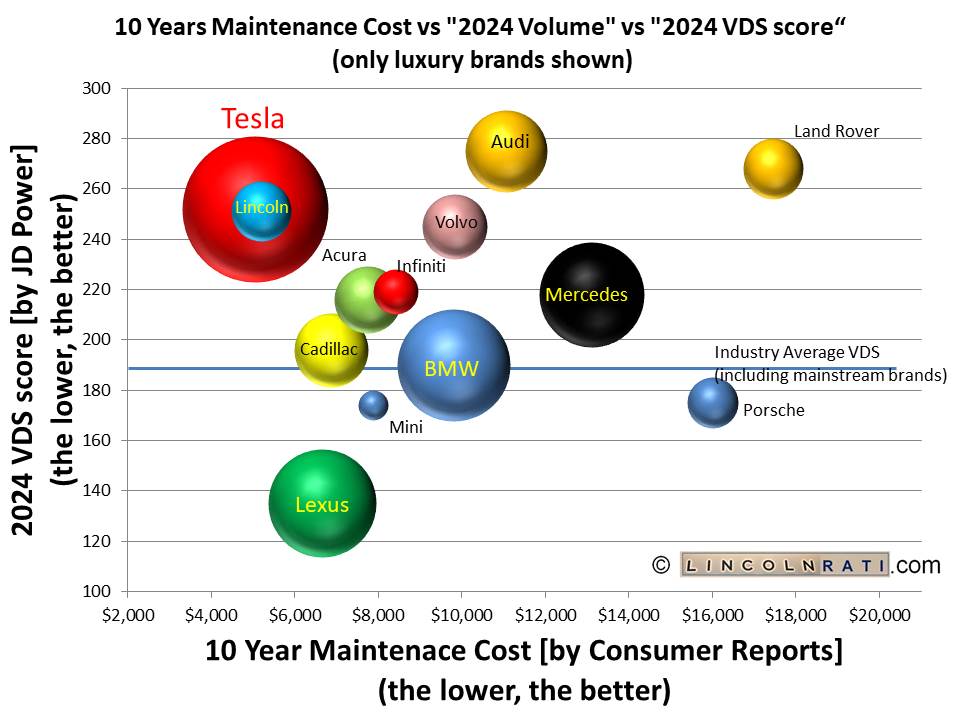|
12/27/2024 0 Comments 2024 US Luxury Vehicle sales - A different way to look at what cars we bought: 2024 VDS score vs 10 yr Maintenance Cost vs 2024 Sales VolumeEarlier last year (2024), when the VDS scores became available, we wanted to see how vehicles compared to each other when you consider a couple of different variables. To recap, especially for those who are not used to these terms, VDS stands for Vehicle Dependability Study, and it is a study, a survey, performed by J.D. Power, the global consumer insights, data and analytics company. This study assesses the reliability of 3-year-old vehicles by surveying owners about the number and type of problems they've experienced. The number of problems reported determines the vehicle's reliability score. Vehicles with fewer reported problems receive smaller scores, representing the number of problems per 100 vehicles (PP100). The smaller the score, the actual number of problems, the better that brand it is. The company J.D. Power has been around for many (50) years, and this study, which is now in its 35th year, covers 184 specific problem areas across nine major vehicle categories: climate, driving assistance, driving experience, exterior, features/controls/displays, infotainment, interior, powertrain, and seats. And, by the way, the world's leading businesses across major industries (not only automotive) rely on J.D. Power to guide their customer-facing strategies. Lexus ranked highest among all brands last year for the second consecutive year, while Toyota ranked highest among mainstream brands. The highest complaints during 2024 were related to infotainment systems, the driver assistance systems and alerts, such as lane departure warning, forward collision warning and so on. In a way this is normal as most cars have so much more technologies and electronics and they are becoming more complex. Beyond that VDS score, we considered the 10 years maintenance and repair costs from Consumer Reports, who survey their members and readers about how much they paid out of pocket for their total maintenance (oil changes, tires, etc.) and repairs during a period of 12 months. They do this study annually. As expected, Tesla costs the least and German brands cost the most. We then plotted a balloon chart that shows the annual sales volumes for those brands in 2024. The size of the balloon represents the size of their 2024 US sales. Here is the result: So, what did we buy, in the US luxury car market (in 2024)?
Is it the quality that is more important to you? Do you care what the maintenance cost is over time? Or, maybe many of us just care so much about the brand that we are loyal to, or what the car looks like, etc. In theory, in that graph, as a brand, you want to be as close as possible to the left corner (origin of the axis), and have the smallest possible cost of maintenance and repairs, and the smallest number possible for the VDS score. As a consumer, you would be most interested in buying a brand from the same area. Not surprising, Lexus is the brand closest to that corner. However, the size of the Lexus balloon is not the biggest: it is one of the largest, but they are not the top seller. Tesla is the top seller, with the largest balloon size, having somewhat of a higher VDS score. Mercedes and BMW, the other high sellers, also have above the average VDS score, which means below average reliability, but that doesn't prevent them either from selling fairly well. So, what happens is that we, the buyers, we are not informed, or we don't really care. Just a reminder, John Harrison said once that “You know you’re priced right when your customers complain—but buy anyway.” Extrapolating, even if the product is not perfect, customers still buy. We still buy the brands that most impress us, that represent us, that better match our personality, that deliver the features that we want the most. Now, the vehicles available on the market nowadays are all very reliable, compared to the cars available decades ago. We complain about various things, but that doesn't keep us from buying. And the most innovative brands (say like Tesla) bring new features and technologies first to the market, surprising buyers, who sometimes feel at a loss dealing with new things that need to be learned. And we complain. It has been proven that if you don't rush new technologies to the market, and let the market learn, adapt to and get used to the new things first with other brands, you could enjoy higher VDS scores and other metrics in the industry. In Lincoln's case, they are one of the easiest and less expensive luxury brands to maintain and repair, rivaling Tesla, which as an EV brand you would expect to have lower maintenance costs anyway. As far as the VDS score, Lincoln is right there with Tesla, but our experience with the recent 2024 Lincoln Nautilus has been nothing short of extraordinary, as the model follows a long streak of great vehicles launched over the last couple of years, and we don't really understand the high number of complaints reflected by JD Power. But, then again, when customers complain and still buy, that is a good sign. It's just like encouragement. It's a sign you are on the right path.
0 Comments
Your comment will be posted after it is approved.
Leave a Reply. |
|
Search by typing & pressing enter


 RSS Feed
RSS Feed